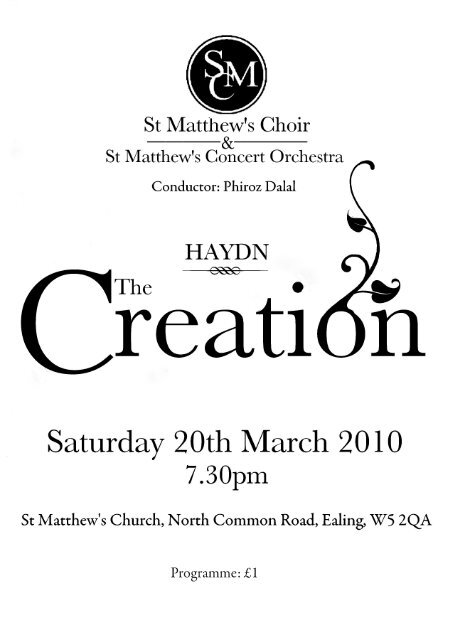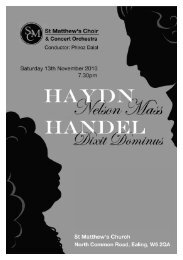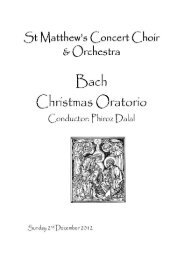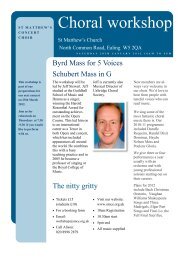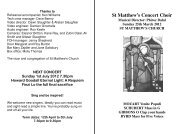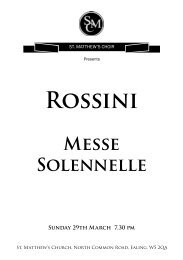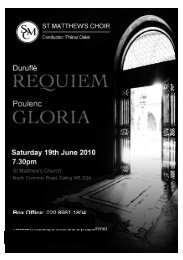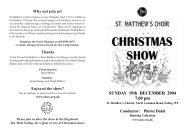Programme: £1 - St Matthew's Choir
Programme: £1 - St Matthew's Choir
Programme: £1 - St Matthew's Choir
You also want an ePaper? Increase the reach of your titles
YUMPU automatically turns print PDFs into web optimized ePapers that Google loves.
<strong>Programme</strong>: £1
The Creation<br />
Franz Joseph Haydn (1732―1809)<br />
When, on his first visit to London in 1791, Haydn<br />
heard Handel’s Messiah, he was ‘struck as if he<br />
had been put back to the beginning of his studies<br />
and had known nothing up to that moment. He<br />
meditated on every note and drew from those<br />
most learned scores the essence of true musical<br />
grandeur’. During his second London visit the<br />
impresario Johann Peter Salomon handed him an<br />
English libretto on the creation of the universe,<br />
based on the accounts in Genesis and Milton’s<br />
Paradise Lost. There were claims that this<br />
manuscript was meant for Handel, but Haydn<br />
immediately saw the potential. On his return<br />
to Vienna he showed it to the Imperial Court<br />
Librarian and Handel enthusiast Baron Gottfried<br />
van Swieten, who produced a German version.<br />
After completing his German text, he produced a<br />
parallel English version that, for all its intermittent<br />
absurdities (the Baron’s English was less perfect<br />
than he liked to think), retains a fair amount of<br />
Milton and the <strong>St</strong> James Bible. The libretto was<br />
ready towards the end of 1796, by which time<br />
Haydn had started on the ‘representation of<br />
Chaos’. Haydn spent most of 1797 working on<br />
the work, and the debut was held on in front of<br />
an invited audience on 30 April 1798. Public<br />
performances followed, many on a grand scale,<br />
and the work was already hailed a huge success by<br />
its England premiere in May 1800.<br />
The work is very simply laid out. Parts One and<br />
Two deal with the creation of the universe in six<br />
days; Part Three is an evocation of the Garden of<br />
Eden on the seventh day, the day of rest. The story<br />
is told through five soloists, archangels Gabriel<br />
(soprano) Uriel (tenor) and Raphael (bass) in Parts<br />
One and Two, and Adam (bass) and Eve (soprano)<br />
in Part Three. Each Day starts with a recit (mostly<br />
with the words ‘and God said’) and ends with a full<br />
chorus of praise to God.<br />
Part One opens with the Representation of Chaos,<br />
a remarkable evocation of void. Without form,<br />
light and heavy textures alternate, and harmonic<br />
journeys that were unheard of in 1800, lead<br />
towards the big bang moment - ‘and there was<br />
Light’. The massive C major chord brings the piece<br />
to order, and the creation continues with Day Two<br />
– the firmament, the waters and the sky. The idea<br />
of heaven and earth singing together is expertly<br />
presented by the duet between Gabriel and the<br />
chorus in ‘the marvellous works’. The echoes<br />
between heaven and earth climax when Archangel<br />
soars to a top C, and the second day is closed with<br />
the ethereal vaults resounding the praise of God.<br />
Day Three features Raphael’s powerful aria rolling<br />
in foaming billows, presenting a stormy seascape,<br />
the creation of the mountains (Haydn’s setting<br />
of the mountain tops ascending into the clouds<br />
puts the bass firmly in tenor territory) and a gentle<br />
meandering brook, a variation on the opening<br />
theme in D major. Day Four, the creation of day and<br />
night, sun, moon and stars contains a magnificent<br />
sunrise, followed by a much gentler moonrise.<br />
Part One, and Day Four close with the heavens are<br />
telling, complete with trio of angels.<br />
Part Two opens with Day Five, when all living<br />
creatures are made. Gabriel tells us of the eagle,<br />
the lark and the dove, in a perfectly set duet<br />
between her and the woodwind. The bassoons are<br />
high in their register as the dove coos, the lark is<br />
characterised by the clarinet, and the nightingale<br />
by the flute. The trio most beautiful appear leads<br />
into the closing song of praise the Lord is great.<br />
In Day Six, Raphael reflects on the creation so far,<br />
and finds that everything is as is should be – the<br />
heavens shine, the birds are in the air and the<br />
beasts are on the ground, but there is something<br />
missing. Uriel takes up the story to tell us that God<br />
created Man. In native worth is another aria of two<br />
halves – the majestic, ‘masculine’ opening section,<br />
portraying the first man, reaches a climax with an<br />
emphatic cadence in the dominant, G major; then,<br />
just as Haydn appears to be repeating the same<br />
procedure, he deflects magically to the distant<br />
key of A flat. The second section fashions softer<br />
contours from Adam’s proud theme, with limpid<br />
woodwind, trumpets put away and a gorgeous<br />
lyrical obligato for cello. Day Six closes with a trio<br />
sandwiched by two choruses each proclaiming that<br />
achieved is the glorious work.<br />
Part Three opens with Uriel introducing Adam<br />
and Eve –Behold the blissful pair, where hand in<br />
hand they go. One of for the only time in the work,<br />
and only for 25 bars, a third flute is required, and<br />
the most serene flute trio sets the scene of Adam<br />
and Eve in paradise. The magnificent Hymn By thee<br />
with bliss Haydn is showing his experience and<br />
manages to put together the strings in triplets, a<br />
beautiful oboe obligato, a love song between Adam<br />
and Eve, and the murmuring chorus praising God.<br />
Before the close, Adam and Eve takes us around<br />
the creation, praising god with the chorus for each<br />
one in turn. The loss of innocence is despatched<br />
rather swiftly, in the final recit of the work – and<br />
the closing song of praise for quartet and chorus<br />
provides a fitting finale to what is arguably Haydn’s<br />
greatest single work.
The Creation<br />
Franz Joseph Haydn (1732―1809)<br />
Part the first<br />
INTRODUCTION<br />
REPRESENTATION OF CHAOS<br />
DAY 1<br />
RECITATIVE<br />
Raphael<br />
In the beginning God created the heaven and the<br />
earth; and the earth was without form, and void;<br />
and darkness was upon the face of the deep.<br />
CHORUS<br />
And the Spirit of God moved upon the face of the<br />
waters. And God said, Let there be light: and there<br />
was light.<br />
RECITATIVE<br />
Uriel<br />
And God saw the light, that it was good: and God<br />
divided the light from the darkness.<br />
AIR<br />
Now vanish before the holy beams<br />
The gloomy shades of ancient night.<br />
The first of days appears.<br />
Now chaos ends, and order fair prevails.<br />
Affrighted fly hell’s spirits black in throngs:<br />
Down they sink in the deep abyss<br />
To endless night.<br />
CHORUS<br />
Despairing cursing rage attends their rapid fall.<br />
A new-created world springs up at God’s command.<br />
RECITATIVE<br />
DAY 2<br />
Raphael<br />
And God made the firmament, and divided the<br />
waters which were under the firmament from the<br />
waters which were above the firmament: and it<br />
was so.<br />
Now furious storms tempestuous rage,<br />
Like chaff, by the winds impelled are the clouds,<br />
By sudden fire the sky is inflamed,<br />
And awful thunders are rolling on high.<br />
Now from the floods in steam ascend reviving<br />
showers of rain,<br />
The dreary wasteful hail, the light and flaky snow.<br />
AIR<br />
Gabriel<br />
The marvellous work behold amazed The glorious<br />
hierarchy of heaven;<br />
And to the’ ethereal vaults resound<br />
The praise of God, and of the second day.<br />
CHORUS<br />
And to the ethereal vaults resound<br />
The praise of God, and of the second day.<br />
RECITATIVE<br />
DAY 3<br />
Raphael<br />
And God said, Let the waters under the<br />
heavens be gathered together to one place, and let<br />
the dry land appear: and it was so.<br />
And God called the dry land earth, and the<br />
gathering of waters called he seas: and God saw<br />
that it was good.<br />
AIR<br />
Rolling in foaming billows,<br />
Uplifted, roars the boisterous sea.<br />
Mountains and rocks now emerge,<br />
Their tops among the clouds ascend.<br />
Through the’ open plains, outstretching wide,<br />
In serpent error rivers flow.<br />
Softly purling, glides on<br />
Through silent vales the limpid brook.<br />
RECITATIVE<br />
Gabriel<br />
And God said, Let the earth bring forth grass, the<br />
herb yielding seed, and the fruit-tree yielding fruit<br />
after his kind, whose seed is in itself, upon the<br />
earth: and it was so.<br />
AIR<br />
With verdure clad the fields appear,<br />
Delightful to the ravished sense;<br />
By flowers sweet and gay<br />
Enhanced is the charming sight.<br />
Here fragrant herbs their odours shed;<br />
Here shoots the healing plant.<br />
With copious fruit the expanded boughs are hung;<br />
In leafy arches twine the shady groves;<br />
O’er lofty hills majestic forests wave.
RECITATIVE<br />
Uriel<br />
And the heavenly host proclaimed the third day,<br />
praising God, and saying,<br />
CHORUS<br />
Awake the harp, the lyre awake,<br />
And let your joyful song resound.<br />
Rejoice III the Lord, the mighty God;<br />
For he both heaven and earth<br />
Has clothed in stately dress.<br />
RECITATIVE<br />
DAY 4<br />
Uriel<br />
And God said, Let there be lights in the<br />
firmament of heaven, to divide the day from the<br />
night, and to give the light upon the earth and let<br />
them be for signs, and for seasons, and for days,<br />
and for years. He made the stars also.<br />
RECITATIVE<br />
In splendour bright is rising now the sun,<br />
And darts his rays; a joyful happy spouse,<br />
A giant proud and glad<br />
To run his measured course.<br />
With softer beams, and milder light,<br />
<strong>St</strong>eps on the silver moon through silent night.<br />
The space immense of the’ azure sky<br />
A countless host of radiant orbs adorns.<br />
And the sons of God announced the fourth day,<br />
In song divine, proclaiming thus his power:<br />
CHORUS<br />
The heavens are telling the glory of God,<br />
The wonder of his work displays the firmament.<br />
TRIO<br />
To day that is coming speaks it the day,<br />
The night that is gone to following night.<br />
CHORUS<br />
The heavens are telling the glory of God,<br />
The wonder of his work displays the firmament.<br />
TRIO<br />
In all the lands resounds the word,<br />
Never unperceived, ever understood.<br />
CHORUS<br />
The heavens are telling the glory of God,<br />
The wonder of his work displays the firmament.<br />
Part the Second<br />
RECITATIVE<br />
DAY 5<br />
Gabriel<br />
And God said, Let the waters bring forth<br />
abundantly the moving creature that hath life,<br />
and fowl that may fly above the earth in the open<br />
firmament of heaven.<br />
AIR<br />
On mighty pens uplifted soars<br />
The eagle aloft, and cleaves the air,<br />
In swiftest flight, to the blazing sun.<br />
His welcome bids to morn the merry lark,<br />
And cooing calls the tender dove his mate.<br />
From every bush and grove resound<br />
The nightingale’s delightful notes;<br />
No grief affected yet her breast,<br />
Nor to a mournful tale were tuned<br />
Her soft enchanting lays.<br />
RECITATIVE<br />
Raphael<br />
And God created great whales, and every living<br />
creature that moveth; and God. Blessed them,<br />
saying, “Be fruitful all, and. multiply,<br />
Ye winged tribes, be multiplied, And sing on every<br />
tree; multiply,<br />
Ye finny tribes, and fill each watery deep; Be<br />
fruitful, grow, and multiply<br />
And in your God and Lord rejoice<br />
And the angels struck their immortal harps, and<br />
the wonders of the fifth day sung.<br />
TRIO<br />
Gabriel<br />
Most beautiful appear, with verdure young<br />
adorned,<br />
The gently sloping hills; their narrow sinuous veins<br />
Distil, in crystal drops, the fountain fresh and<br />
bright.<br />
Uriel<br />
In lofty circles play, and hover in the air, The<br />
cheerful host of birds; and as they flying<br />
whirl their glittering plumes are dy’d as rainbows<br />
by the sun.<br />
Raphael<br />
See flashing through the deep in thronging swarms<br />
The fish a thousand ways around.<br />
Upheaved from the deep, the’ immense Leviathan<br />
Sports on the foaming wave.<br />
Gabriel, Uriel, and Raphael<br />
How many are thy works, O God I<br />
Who may their number tell?<br />
TRIO AND CHORUS<br />
The Lord is great, and great his might,<br />
His glory lasts for ever and for evermore.<br />
INTERVAL
AIR<br />
Raphael<br />
Now heaven in fullest glory’ shone;<br />
Earth smiled in all her rich attire;<br />
The room of air with fowl is filled;<br />
The water swelled by shoals of fish;<br />
By heavy beasts the ground is trod:<br />
But all the work was not complete;<br />
There wanted yet that wondrous being,<br />
That, grateful, should God’s power admire,<br />
With heart and voice his goodness praise.<br />
RECITATIVE<br />
DAY 6<br />
Uriel<br />
And God created Man in his own image, in the<br />
image of God created he him. Male and female<br />
created he them.<br />
He breathed into his nostrils the breath of life, and<br />
Man became a living soul.<br />
AIR<br />
In native worth and honour clad,<br />
With beauty, courage, strength, adorned,<br />
Erect, with front serene, he stands<br />
A man, the lord and king of nature all.<br />
His large and arched brow sublime<br />
Of wisdom deep declares the seat<br />
And in his eyes with brightness shines<br />
The soul, the breath and image of his God.<br />
With fondness leans upon his breast<br />
The partner for him formed,<br />
A woman, fair and graceful spouse.<br />
Her softly-smiling virgin looks,<br />
Of flowery spring the mirror,<br />
Bespeak him love, and joy, and bliss.<br />
RECITATIVE<br />
Raphael<br />
And God saw every thing that he had made,<br />
and behold, it was very good. And the heavenly<br />
choir, in song divine, thus closed the sixth day.<br />
CHORUS<br />
Achieved is the glorious work;<br />
The Lord beholds it, and is pleased,<br />
In lofty strains let us rejoice,<br />
Our song let be the praise of God.<br />
TRIO<br />
Gabriel and Uriel<br />
On thee each living soul awaits;<br />
From thee, O Lord, all seek their food;<br />
Thou openest thy hand,<br />
And fillest all with good.<br />
Raphael<br />
But when thy face, O Lord, is hid,<br />
With sudden terror they are struck;<br />
Thou takest their breath away,<br />
They vanish into dust.<br />
Gabriel, Uriel, and Raphael<br />
Thou sendest forth thy breath again,<br />
And life with vigour fresh returns;<br />
Revived earth unfolds new strength<br />
And new delights.<br />
CHORUS<br />
Achieved is the glorious work;<br />
Our song let be the praise of God.<br />
Glory to his Name for ever.<br />
He sole on high exalted reigns.<br />
Hallelujah!<br />
Part the Third<br />
INTRODUCTION - MORNING<br />
RECITATIVE<br />
DAY 7<br />
Uriel<br />
In rosy mantle appears, by music sweet awaked,<br />
The morning, young and fair.<br />
From heaven’s angelic choir<br />
Pure harmony descends on ravished earth.<br />
Behold the blissful pair,<br />
Where hand in hand they go: their glowing looks<br />
Express the thanks that swell their grateful hearts.<br />
A louder praise of God their lips<br />
Shall utter soon; then let our voices ring,<br />
United with their song.<br />
DUET<br />
Adam and Eve<br />
By thee with bliss, O bounteous Lord,<br />
Both heaven and earth are stored.<br />
This world so great, so wonderful.<br />
Thy mighty hand has framed.<br />
CHORUS<br />
For ever blessed be his power,<br />
His Name be ever magnified.<br />
Adam<br />
Of stars the fairest, pledge of day,<br />
That crownest the smiling morn;<br />
And thou, bright sun, that cheerest the world,<br />
Thou eye and soul of all;<br />
CHORUS<br />
Proclaim in your extended course<br />
The’ almighty power and praise of God.<br />
Eve<br />
And thou that rule’s the silent night<br />
And all ye starry hosts,
Everywhere spread wide his praise<br />
In choral songs about.<br />
Adam<br />
Ye mighty elements, by his power<br />
Your ceaseless changes make;<br />
Ye dusky mists, and dewy streams,<br />
That rise and fall thro’ the’ air;<br />
CHORUS<br />
Resound the praise of God our Lord.<br />
Great his name, and great his might.<br />
Eve<br />
Ye purling fountains, tune his praise;<br />
And wave your tops, ye pines.<br />
Ye plants, exhale, ye flowers, breathe<br />
To him your balmy scent.<br />
Adam<br />
Ye that on mountains stately tread,<br />
And ye that lowly creep;<br />
Ye birds that sing at heaven’s gate,<br />
And ye that swim the stream;<br />
Eve and Adam<br />
Ye creatures all, extol the Lord;<br />
CHORUS<br />
Ye creatures all, extol the Lord;<br />
Him celebrate, him magnify.<br />
Eve and Adam<br />
Ye valleys, hills, and shady woods,<br />
Made vocal by our song, .<br />
From morn till eve you shall repeat<br />
Our grateful hymns of praise.<br />
CHORUS<br />
Hail! bounteous Lord! Almighty, hail I<br />
Thy word called forth this wondrous frame,<br />
The heavens and earth thy power adore;<br />
We praise thee now and evermore.<br />
RECITATIVE<br />
Uriel<br />
O happy pair and happy still might be<br />
If not misled by false conceit.<br />
Ye strive at more than granted is;<br />
And more desire to know, than know ye should.<br />
CHORUS<br />
Sing the Lord, ye voices all,<br />
Magnify his name through all creation,<br />
Celebrate his power and glory,<br />
Let his name resound on high.<br />
Praise the Lord. Utter thanks.<br />
Jehovah’s praise for ever shall endure.<br />
Amen.<br />
RECITATIVE<br />
Adam<br />
Our duty we have now performed,<br />
In offering up to God our thanks.<br />
Now follow me, dear partner of my life,<br />
Thy guide I’ll be; and every step<br />
Pours new delights into our breasts,<br />
Shows wonders everywhere.<br />
Then mayst thou feel and know the high<br />
Of bliss the Lord allotted us, [degree<br />
And with devoted heart His bounties celebrate.<br />
Come, follow me, thy guide I’ll be.<br />
Eve<br />
o thou for whom I am, my help, my shield,<br />
My all, thy will is law to me; .<br />
So God our Lord ordains; and from obedience<br />
Grows my pride and happiness.
Soloists<br />
Gabriel<br />
Uriel<br />
Raphael<br />
Eve<br />
Adam<br />
Joanna Marie Skillett<br />
Adam Crockatt<br />
Antoine Salmon<br />
Aurélia Jonvaux<br />
Clément Dionet<br />
Joanna Marie Skillett studies at The Royal Academy<br />
of Music on the Masters Preparatory Opera Course. Since<br />
her concert operatic debut as Violetta in Verdi’s La Traviata,<br />
she appears regularly as a soloist, most recently with ETO in<br />
the premiere of ‘Speakout’, with regular appearances in RAM<br />
Bach Cantatas and guest appearances with choral societies.<br />
She will be performing the title role of Dvořák’s Rusalka for<br />
RAM’s Summer Opera Evenings. Awarded The Freda Parry<br />
Scholarship for Singing and Essex Musician of the Year 2009,<br />
she is an active music-in-the-community supporter, and the<br />
award of the RAM Open Academy Fellowship allows her to<br />
lead music workshops in London primary schools. She is<br />
supported by RAM, The Cooper’s Company, The George Heim<br />
Memorial Fund and The Freda Parry Trust.<br />
www.joannamariesoprano.com<br />
Adam Crockatt is a tenor in his fourth year of a Vocal<br />
<strong>St</strong>udies degree at Guildhall School of Music and Drama in<br />
London, under the tutelage of Adrian Thompson. Before<br />
starting in the opera field he gained a BAHons degree in<br />
Contemporary Music Performance (electric guitar) from<br />
the Academy of Contemporary Music in Surrey. Future<br />
engagements include Iain Burnside’s Lads In Their Hundreds<br />
over May and June this year, followed by a trip to Banff in<br />
Canada to perform as Laurie in Banff’s Opera As Theatre<br />
production of Little Women, by Mark Adamo. Adam’s previous<br />
vocal work has seen him appear in the chorus of the British<br />
Youth Opera’s production of La Rondine (Puccini), and two<br />
highly acclaimed productions by Dorset Opera, Herodiade<br />
(Massenet) and the British premiere of the Berio ending of<br />
Puccini’s Turandot.
Antoine Salmon, bass, read New Technologies in<br />
Paris. He transferred to full-time voice training in 2004<br />
studying with David Pollard at the Guildhall School of Music &<br />
Drama where he is currently finishing his MMus in Classical<br />
Improvisation. Operatic roles include Prince Gremin (Eugene<br />
Onegin) for Dartington Summer Festival 2008, Dulcamara<br />
(Elixir of Love) and Basilio (Barbiere di Siviglia). His concert<br />
repertoire includes Bach’s <strong>St</strong>. John Passion as Jesus, Handel’s<br />
Messiah and Mozart’s Requiem. Recent roles include Mr.<br />
Benoît (La Bohème) and Doctor Grenvil (La Traviata). Plans<br />
include Guccio (Gianni Schicchi) in Bayreuth, Count Ribbing (A<br />
Masked Ball), the title role in Don Pasquale and Don Alfonso<br />
(Così fan tutte).<br />
Aurélia Jonvaux, soprano, is currently finishing her<br />
Master I in Music Performance, studying with David Pollard<br />
at the Guildhall School of Music & Drama where she gained<br />
a First Class BMus (Hons) in 2008. Operatic roles include<br />
Pamina (Die Zauberflöte), Annina (La Traviata) and Musetta<br />
(La Bohème). Her concert repertoire includes Pergolesi’s<br />
<strong>St</strong>abat Mater, Charpentier’s Te Deum and Handel’s Messiah.<br />
Plans include Giannetta, the understudy of Adina (The Elixir of<br />
Love), Belinda (Dido & Aeneas) and Despina (Così fan tutte).<br />
Recent engagements include a series of dramatised song<br />
performances (The Lads in their Hundreds) devised by Iain<br />
Burnside.<br />
Clément Dionet, baritone, studies singing at the<br />
Guildhall School of Music and Drama, London. He has taken<br />
masterclasses under, amongst others, Maciej Pikulski and<br />
Dalton Baldwin. His operatic premiere took place in a 2006<br />
production of Die Zauberflöte, Mozart at the Hôtel Gouthière,<br />
Paris, where he sang the part of Papageno. He made his<br />
debut in Italy in 2008 at Sala Verdi, Milan with the part of<br />
Benoît in Puccini’s La Bohème. His wide repertoire goes from<br />
medieval and baroque music with The Royaumont Foundation,<br />
to contemporary music with songs by Guy Sacre. In Paris,<br />
he performs regularly with pianist François-Xavier Villemin,<br />
sings with acclaimed Russian pianist Katia Nemirovitch-<br />
Dantchenko, and in Shanghai, China with pianist Zhang<br />
Liang. He has also performed as a soloist with Ut Cinquième<br />
Orchestra, Paris et Note et Bien, as well as with the Ensemble<br />
vocal du COGE and Concert Latin. He was recently invited to<br />
Osaka, Japan, to give a recital of French songs.
<strong>St</strong> Matthew’s Concert Orchestra<br />
Violin<br />
Sophie Mather (Leader)<br />
Catherine Tarling<br />
Mark Johnson<br />
Cath Lemmon<br />
Saori Howse<br />
Eimi Howse<br />
Kate Faber<br />
Mark Robbins<br />
Nawzad Mohammed<br />
Adrian Hailstone<br />
Edward McCullagh<br />
Keiko Thiele<br />
Viola<br />
Ian Byrne Brito<br />
Hilary Potts<br />
Jessica Hailstone<br />
David Marsh<br />
Cello<br />
Becky Imgrueth<br />
Nadia Beard<br />
Andrew Pears<br />
Bass<br />
Richard Hammett<br />
Peter Peecock<br />
Flute<br />
Anne Allen<br />
Heather Loebl<br />
Ron Keefe<br />
Oboe<br />
Vivien Karam<br />
Richard Partridge<br />
Clarinet<br />
Andrew Keck<br />
James Wolfe<br />
Bassoon<br />
<strong>St</strong>eve Warrington<br />
Erica Tugwell<br />
Horn<br />
Chris Eyre<br />
Caroline Emery<br />
Trumpet<br />
Barry Yardley<br />
<strong>St</strong>eve Wycherley<br />
Trombone<br />
Justin Waterman<br />
David Willis<br />
Fred Syed<br />
Timpani<br />
Katherine Pears<br />
Continuo<br />
Ken Williams<br />
Conductor and Musical Director<br />
Phiroz Dalal‘s music training began at a young age when he<br />
studied piano to Grade VIII with Eileen Rowe in Ealing, and when he<br />
began singing with his school and <strong>St</strong> Matthew’s <strong>Choir</strong>. While studying<br />
Civil Engineering at King’s College, London , he was able to pursue<br />
his musical interests by joining various central London choirs and<br />
also acting as an accompanist for singing lessons and choirs. He<br />
started conducting in 1999 when he succeeded Tim Godfrey as<br />
Questor’s <strong>Choir</strong>’s Musical Director, and moved to <strong>St</strong> Matthew’s in<br />
2002, succeeding Chris Richardson. He studied Choral Education<br />
at the University of Roehampton under Dr Therees Tchack Hibbard,<br />
Professor Colin Durrant and Bob Chilcott, gaining an MA in 2008.<br />
His conducting and chorus master repertoire is extensive, from<br />
sublime 16th century motets to ridiculously complex works such<br />
as Tchaikovsky’s Eugene Onegin. He sings with the BBC Symphony<br />
Chorus, regularly appearing in the Proms and touring with them,<br />
recently appearing in performances as diverse as Monty Python’s Not<br />
the Messiah and Poulenc’s Figure Humaine. As a project manager<br />
and chartered engineer he is part of the London 2012 management<br />
team.
With Thanks<br />
Musical director and chorus master<br />
<strong>Choir</strong> manager<br />
Repetiteur<br />
Orchestral management<br />
Treasurer and librarian<br />
Rehearsal refreshments<br />
Box office<br />
Front of house<br />
<strong>St</strong>aging<br />
Technical director<br />
Sound director<br />
Video director<br />
Video controller<br />
Cameras<br />
<strong>St</strong>oryboard and video playback<br />
Poster<br />
<strong>Programme</strong> and publicity<br />
Licensing<br />
Vocal scores<br />
Phiroz Dalal<br />
Alison Dalal<br />
Ken Williams<br />
David Marsh<br />
Karen Benny<br />
Dinah Walker,<br />
Jenny Shepherd<br />
Molly Thomas<br />
Roy Burton<br />
Members of the choir<br />
David Benny<br />
Ron Keefe<br />
Dawn Slaughter<br />
Eleanor Britton<br />
Peter Cocup, Ali Smith,<br />
William Walker, Zubin Dalal<br />
Richard Thomas<br />
Carla Evans<br />
Alison <strong>St</strong>awarz<br />
Jane Salisbury<br />
Ealing Music Library<br />
Our thanks as ever to Peter Watkins, vicar of <strong>St</strong> Matthew’s Church,<br />
and to the congregation for their support. Thanks also to Jenny and<br />
Alan Price for making sure we had tables and chairs.<br />
Easter Services: Services of music and devotion on Good Friday at<br />
10.30am and Easter Sunday at 10.30am.<br />
About <strong>St</strong> Matthew’s <strong>Choir</strong><br />
<strong>St</strong> Matthew’s Church has an enviable reputation<br />
for the excellence of its music, both in concert<br />
and in the services. The concert choir’s recent<br />
performances include Vaughan Williams’ Mass<br />
in G Minor, Orff’s Carmina Burana, Bernstein’s<br />
Chichester Psalms, and Rachmaninov’s Vespers.<br />
The choir regularly collaborates with West London<br />
Sinfonia, and has performed Tchaikovsky’s<br />
Eugene Onegin, Verdi’s Requiem, and Mahler’s<br />
Second Symphony with them. Since 2003, <strong>St</strong><br />
Matthew’s <strong>Choir</strong> concerts have been projected on<br />
a big screen above the performers, meaning the<br />
audience is able to watch the normally unseen<br />
parts of the performance, such as pianists’ or<br />
organists’ fingers, and the conductor’s face. The<br />
choir enjoys high musical standards and a full<br />
diary, and is always delighted to hear from anyone<br />
interested in joining.
Coming next<br />
DURUFLÉ requiem<br />
POULENC gloria<br />
Saturday 19 June 2010, 7.30pm<br />
First Rehearsal: 15 April 2010<br />
NEW MEMBERS WITH SOME SINGING EXPERIENCE ARE ASSURED A WARM WELCOME<br />
To find out more call: 020 8998 2879 | email: manager1@smce.org.uk | visit: www.smce.org.uk


